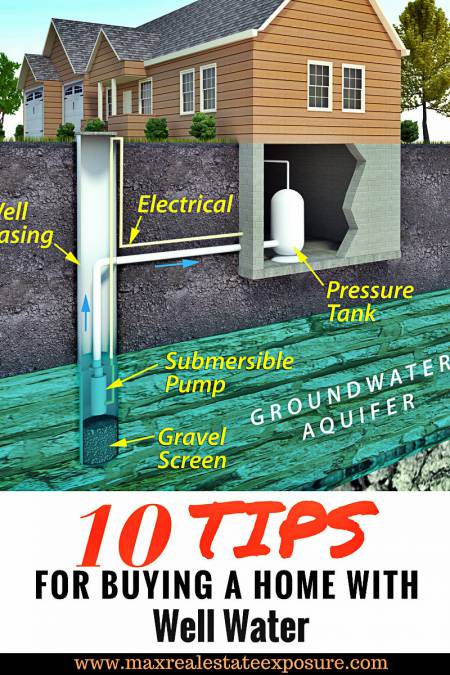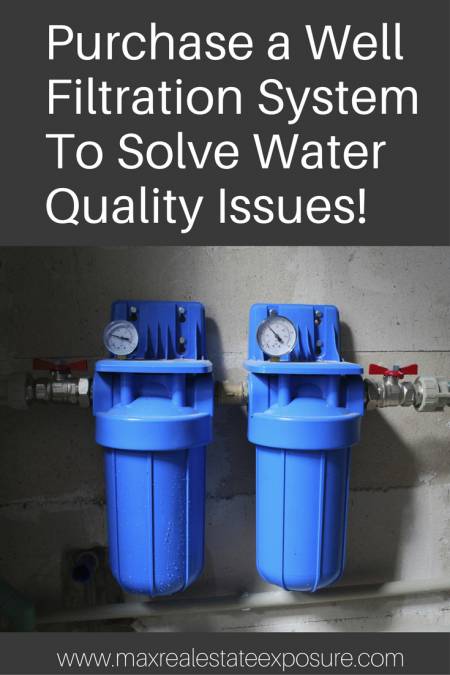Things To Consider When Buying A Home With A Well
 Well inspections are critical when buying a home with a well as the primary water source. Buyers considering homes in rural settings often encounter houses for sale that get their water from wells.
Well inspections are critical when buying a home with a well as the primary water source. Buyers considering homes in rural settings often encounter houses for sale that get their water from wells.
With homes drawing on municipal sources, there is an assumption that the water in the house will be readily available and meet the safety standards of the municipality.
But with private water, you cannot make any assumptions about its purity. Beyond water quality, other problems can arise with wells that you should be aware of and check for before you agree to purchase a home.
Getting a good inspection is crucial when buying a house serviced by private water. A professional conducts a water well inspection to assess the quality and quantity of water and the equipment.
From experience as a Realtor and homeowner, your well-system performance goes a long way toward being happy with your property.
Keep reading to learn about everything you need to know about investing in housing with well water.
Inspections Include Quality and Quantity Checks
The examination will ensure the water is safe and not cause health problems. The examination will also prove whether it holds enough water to service the property adequately.
Requirements for an examination vary from state to state. Generally, the inspector will ensure that the well is in the proper location on the property and that there is no damage to the construction or parts of the equipment.
The review will typically include the entire water system. Inspectors will examine the pump, pressure tank, wellhead, and well casing. A thorough examination of the well equipment should be done, including the seals and gaskets.
Whether buying or selling a home, there are always questions regarding testing the water when a private well services a property.
If you purchase a house serviced by a well and not by public water, you better ensure it is tested as part of your sale contingency! Checking on private water quantity and quality should never be skipped.
Do Your Research About Water in The Area
Groundwater is a shared resource across broad areas, so problems that affect one home will involve many more. You can research known water issues in a place through the EPA and ask your Realtor about any known troubles in the area.
Once you know of common issues, you can be on the lookout for them.
Where I am located, Massachusetts General Law (MGL Ch.111 s.122) states that local Boards of Health have the primary jurisdiction over regulating private wells.
The local health board is empowered to adopt private well water regulations establishing criteria for location, construction, water quality, and quantity.
You should check your state for how they handle the well criteria.
Know The Well Water Regulations For The Area Where You Are Buying
Different states and sometimes municipalities have rules and regulations concerning wells in the area and codes you should know when buying a home. Depending on the location, the home’s seller may be required to test the well water before selling you the house.
For example, in Hopkinton, Massachusetts, one of the areas where I sell homes, the seller must test the water quality before passing papers. Hopkinton is one of the few towns in the area with this requirement. An excellent buyer’s agent servicing Hopkinton should understand this before making an offer.
In most locations, it is the buyer’s responsibility to check the well’s quality and quantity. Well inspections should never be skipped when buying a home.
In Massachusetts, the homeowner will also need a permit to have the well, a permit which you will want to see before you buy if it is new construction. Knowing the local industry guidelines is essential to ensure the healthy operation of your system.
Well Inspections Near Me
You may be wondering how to find an excellent well inspector.
Most inspectors for homes will not perform well testing when purchasing a property and conducting a home inspection. You will need to get a separate well inspector. Some companies specialize in testing an artesian well.
A well inspection company usually does complete system installations if there are problems. Your Realtor should be able to give you a good recommendation for choosing someone who does these inspections. If your real estate agent has little experience with wells, Google will be an excellent resource for help.
Searching for well inspection near me or well inspectors near me should provide excellent results. Do a bit of due diligence to ensure the inspector you choose has an excellent reputation. The research will give you peace of mind that you’re picking a highly respected company.
A Private Water Inspection Should Check The Quality!
Water quality sampling is done in most real estate transactions with a well.
 Don’t buy a home without having the well tested first. The well is on the list of things you should inspect when purchasing a home. A few tests can be conducted, the most obvious of which is one for water safety and purity.
Don’t buy a home without having the well tested first. The well is on the list of things you should inspect when purchasing a home. A few tests can be conducted, the most obvious of which is one for water safety and purity.
A water sample will be taken from the tap at the home and then sent to a qualified water testing lab to get a clear idea of what it contains. Inspectors will use a well-water test kit. You will receive a comprehensive lab report detailing the water samples taken.
The lab will show test results of what the water contains and the passing limit for each element. The analysis is very comprehensive.
You will want to have a water professional familiar with the area provide insights of the results to help you understand them, as conditions vary quite a bit in different regions.
Recommendations will be made based on the results.
Standard water tests typically check for PH, hardness, alkalinity, and turbidity. Routine mineral testing will often include iron, calcium, manganese, copper, fluoride, Chloride, and others.
These minerals are a normal part of a standard well water test kit.
A bacteria test is also completed. Coliform bacteria is checked in most tests, especially in rural areas—E. coli, a subgroup of fecal coliforms.
Professional inspectors or the local health department should be able to share the health risks of anything found.
Checking For Volatile Compounds is a Crucial Part of an Inspection
It is also highly recommended that you check for VOCs as well. Volatile organic compounds are bad things you don’t want in your water. Examples of VOCs include gasoline compounds such as MTBE and benzene.
These are toxic substances that private well owners should be aware of. Other things to look for with properties include chemicals, nitrates, pesticides, fertilizer, paint, and motor oil.
You should be conscious of the need to test for radon in water. Radon is not on the list of automatically checked elements in many places. However, real estate agents should understand this and advise their clients of the need to check for radon.
If you are buying a home with a private water source, ask the person conducting the test to have the lab screen for radon. It is important not to miss this item.
If you find that the test has determined high radon levels in the water, it can be fixed quickly enough. The repairs, however, are not cheap. The average cost to remove radon in water is $5000-$6000. Defects like this should not be ignored.
An Inspection Should Check The Quantity
Most locations require The well to produce 3-5 gallons per minute. Generally, a 3-gallon minimum is necessary for older homes and new homes, 5 gallons per minute. You can also have the flow rate and the yield tested by professionals with the right equipment.
A professional inspection will do just that. Just because a well has clean, safe drinking water does not mean it contains enough water to meet the needs of your household.
There are several methods to check the amount of water provided. The first is water storage capacity. A traditional 6-inch drilled well can store 1.5 gallons of water per foot. If you can find out the well’s depth, the water’s level, and the pump depth, you can determine the storage capacity.
When checking on a well’s water supply, the first test is often a flow rate test. The flow refers to the amount of water coming from the source, and the flow rate measures the gallons per minute being dispersed.
The average home needs 100 to 120 gallons per person daily and a flow rate of about 6 to 12 gallons per minute. The requirement could be greater if a large family creates more water demand.
Before you buy, it is essential to know that it will generate enough water, flow rate, and overall capacity to meet the needs of your home for the long haul. Otherwise, you will need to drill another well – or wait for it to refill, which can take a long time.
Testing will reveal all of these critical data points worth knowing.
What Does an Examination Cost?
Like home inspections, the cost for a well inspection can vary from location to location and company to company. For the flow test, you can expect inspection costs to run between $300 and $ 600. Remember that a lab will have additional expenses to read the quality results. Lab fees can add a few hundred more dollars to the estimate.
Inspections will include checking for mechanical problems, including the water pump, storage tank, pressure tank parts, pressure gauge, wiring, and well cover.
Faulty gauges can provide inaccurate results or potential problems that don’t exist. It is a common issue that is easily corrected.
What to Do If The Quantity Fails
 So what happens if you have found your dream home, tested it, and failed? Don’t despair; hope is not lost yet. There are ways you can effectively fix a well that has failed the quantity test.
So what happens if you have found your dream home, tested it, and failed? Don’t despair; hope is not lost yet. There are ways you can effectively fix a well that has failed the quantity test.
Two standard methods of fixing quantity issues are:
- Drilling a new artesian well – You will find a new location on the lot and put an entirely new system into the ground. The goal, of course, is to hit a good water source. Drilling a freshwater source can be expensive. The cost of drilling a new well can vary substantially. Determining factors include where you are located, the conditions of the soil, and how deep it needs to be to generate a constant water supply. Plan on spending anywhere from $5,000-$15,000 drilling a new well.
- Hydro-fracking – Hydro-fracking is another method to fix water quantity issues. The process involves injecting high-pressure water via the drilled well into the surrounding rock formations. Hydro-fracturing aims to widen fractures in the bedrock and extend them further into the formation to increase the network of water-bearing fissures supplying water to the well.
Hydro-fracking will be successful often, and you will not need to drill a new well. However, it is only suitable for wells getting their water supply from water moving through fractures and fissures in existing bedrock.
Some companies provide these services. They are experts at finding a viable water source.
The Property Should Have at Least an Acre if it Has Private Water.
The city or town typically approves private water source locations.
If the property has a well, it might also have a septic system – which processes the waste produced by the home.
Septic systems are almost certain to fail given enough time, which usually means waste leaks out of the system and into the ground. If there is less than an acre of property, the well and septic system are probably close enough that the septic system leak will contaminate the water.
In Massachusetts and probably many other states, they must be located significantly from a septic system for this exact reason.
Replacing septic systems can be costly, so make sure you do an inspection when buying a house that has one. A septic inspection will be done by a different company specializing in that field.
Remember, septic systems need maintenance. The cost of pumping a septic system every few years is minimal compared to replacement costs.
When there is less than an acre, fitting the home, a well, a septic system, and potentially a swimming pool can be more challenging. How big is an acre? Check the helpful resource.
Only Buy a Home With a Drilled Well
A drilled well is built with special equipment and typically goes down 100 feet or more. At the least, it will be over 40 feet deep in most cases. They are usually easy to recognize because a pipe will be sticking up at least a foot or more from the ground, with a thick cap on the end.
Most homes will have drilled wells, but occasionally, you will run across a house with a dug or bored well. These are much less reliable and more prone to contamination. You do not want anything other than a drilled water source.
Ask About The Age of The System
The inspection should give some clear signs if the owner does not know the well’s age. The average lifespan is 30-50 years, although they can last longer or shorter depending on circumstances.
If the one you buy is over 20 years old, you should at least factor in replacing the parts that commonly fail into your home-buying budget. If it is 15 or older, you should consider budgeting replacement parts such as a pump or pressure tank.
It is standard for these pumps to last around ten years or so.
The Well and The Septic System Should Be at Least 100 Feet Apart
As discussed above, the septic system can leak, making its way into your private water. An excellent general rule is that each system should be separated by 100 feet or more.
It is best to avoid buying the house if you come across a home with a septic system close to the well. This, however, would be rare, as most municipalities do not allow such clear violations.
The Board of Health typically does private water well inspections before a new home’s occupancy permit is granted.
The Well Cap Should be Uphill or on Level Ground
All the contaminants that fall on the ground, like oil and grease from your driveway or manure from livestock, will flow downhill and contaminate a well where water pools on the floor. You want your well to be located on a level surface or uphill so that contaminants do not accumulate on top of it.
Well inspections conducted by a professional will often provide any action necessary to rectify this issue.
What to Do to Fix Quality Issues
 When you have the well tested, you may discover that it has specific contaminants that make it undesirable, like contaminants that affect the water’s taste, smell, or texture.
When you have the well tested, you may discover that it has specific contaminants that make it undesirable, like contaminants that affect the water’s taste, smell, or texture.
Fortunately, there are many options available for dealing with such contaminants – so it is not the end of the world if there are problems with the water, at least not always.
Talk with the water professional who tests and see if there are options for correcting the problem if you are interested in the home.
Almost any kind of issue can be fixed with a proper filtering system. While some water treatment systems can eliminate several pollutants, not just one treatment system can work for every application or contaminant.
It is crucial to know the ability of the treatment methods being considered, what impurities they get rid of, precisely what flow rates they will handle, and what water pressures they will work within.
Almost all water treatment systems are self-cleaning and must have a specific minimum flow rate. The common problem is using a treatment system requiring particular gallons per minute, but the existing well pump produces less than the treatment system requires.
These two things need to be appropriately aligned.
Understanding Water Pressure
Water pressure is also a factor in choosing a water treatment system. Nearly all treatment systems will decrease the water pressure as the water goes through the equipment.
Determining the pump’s water pressure is essential before picking a treatment system. If you don’t, water pressure will likely be fouled up in the home.
Some of the most common treatment issues include treating for iron and hardness. If you have found these issues, they are easy problems to fix. Also, be aware that sediment can clog plumbing and pipes, leading to low pressure from sinks and faucets.
Interesting Data Points
1. Approximately 98% of residential wells in the United States pass inspection for safe drinking water.
2. On average, well inspections identify 2.5 minor maintenance issues per household.
3. There is a 79% decrease in well contamination cases after implementing regular inspection and maintenance programs.
4. Wells inspected every five years have a 92% lower chance of developing significant issues than those inspected every ten years.
5. Well examinations contribute to a 67% reduction in waterborne diseases in communities with private wells.
6. Out of every 100 first-time well inspections, only 6% require immediate repairs or modifications.
7. Homes with more than one well on their property are 43% more likely to experience contamination if reviews are not conducted regularly.
8. Regular maintenance can extend the lifespan of a well pump by an average of 7 years.
9. Investments in examination and maintenance programs result in an estimated savings of $200 million annually in potential healthcare costs associated with waterborne illnesses.
Final Thoughts
When buying a home, take the time to test both the quality and quantity of the water. More homeowners find out the hard way after purchasing a home and skipping these crucial home inspection tests.
Don’t make the same mistakes many other buyers have made. Get the water tested as part of your well inspection due diligence! Routine water testing should also be done every few years to ensure nothing changes. The benefits are significant, especially when you discover a repair is needed.
It is an investment in ownership you won’t regret.
Hopefully, you now understand better how critical a well water test is when purchasing a home.
About the Author: The above Real Estate information on private well water inspections was provided by Bill Gassett, a Nationally recognized leader in his field. Bill has expertise in mortgages, financing, moving, home improvement, and general real estate.
Learn more about Bill Gassett and the publications he has been featured in. Bill can be reached via email at billgassett@remaxexec.com or by phone at 508-625-0191. Bill has helped people move in and out of Metrowest towns for the last 37+ years.
Are you thinking of selling your home? I am passionate about real estate and love sharing my marketing expertise!
I service Real Estate Sales in the following Metrowest MA towns: Ashland, Bellingham, Douglas, Framingham, Franklin, Grafton, Holliston, Hopkinton, Hopedale, Medway, Mendon, Milford, Millbury, Millville, Natick, Northborough, Northbridge, Shrewsbury, Southborough, Sutton, Wayland, Westborough, Whitinsville, Worcester, Upton, and Uxbridge MA.
Bill, thanks again for the timely and well researched information. (Pun intended!)
Linda – over the years while representing home sellers I have seen numerous buyers skip a well inspection because their buyer’s agent didn’t inform them of how important it can be. Testing a well is a vital part of purchasing a home and should never be skipped!
I am sharing this article with a friend of mine. He made an offer of a mobile home sitting on 5 acres. He tested the water, attempted to test septic and was all set to purchase when the appraisal came in well below the asking price. However, there was not enough information on well inspection and septic system per your thorough blog post Bill! Thanks for sharing.. Eileen in Hollywood, FL…. the property was located in Pinetta at the Florida/Georgia line.